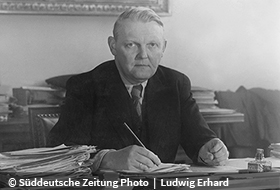History of the ifo Institute
The history of the ifo Institute officially begins in January 1949. Ludwig Erhard, the founder of the Social Market Economy, was an important figure in the founding history of the institute. He laid the foundations for applied policy-oriented economic research in Munich, which still constitutes the ifo today.

The history of the ifo Institute goes back to 1942. Ludwig Erhard provided an important impulse for the foundation of the company. He felt called upon to lead German's population into a better future through growing prosperity. He wanted to achieve this through fundamental market-economy reforms. Erhard early coined the metaphor of the "bridge" that the institute had to form between economic research and state as well as economic practice.
The Early Years
 The ifo Institut was not designed on the drawing board, but continued the work of two merged institutions seamlessly from January 1949: the Süddeutsches Institut für Wirtschaftsforschung and the Informations- und Forschungsstelle für Wirtschaftsbeobachtung. The Bavarian Statistical Office did only launch the latter in April 1948. The Bavarian State Government, in particular the Ministry of Economic Affairs, played a major role in the merger.
The ifo Institut was not designed on the drawing board, but continued the work of two merged institutions seamlessly from January 1949: the Süddeutsches Institut für Wirtschaftsforschung and the Informations- und Forschungsstelle für Wirtschaftsbeobachtung. The Bavarian Statistical Office did only launch the latter in April 1948. The Bavarian State Government, in particular the Ministry of Economic Affairs, played a major role in the merger.
The working method and the tasks of the new institute were clearly outlined in the founding statutes: "The institute shall observe economic and social processes at home and abroad independently and in cooperation with other research institutions, in particular the State Statistical Offices, collect and evaluate the relevant material, make the research results accessible to the administration, science and industry". On 1 March 1949, the Institute was able to begin its work. Initially, the scientists resided in Rosenheimer Strasse, from March 1952 in Poschingerstrasse, where the headquarters of the ifo Institute are still located today.
Start with Three Main Departments
Three main departments formed the starting point of the scientific work at that time:
- the economic department for the observation and analysis of macroeconomic and, in particular, economic developments,
- sectoral research, including business surveys and other enterprise surveys, and
- the business management department.
Since September 1993, the branch in Dresden has belonged to the ifo Institute. ifo Dresden is institutionally supported by the Free State of Saxony and has its own independent tasks as well as its own financing.
In September 1997, the ifo Institute signed the first cooperation agreement with the Bavarian State Government and the Ludwig-Maximilians-University (LMU). In 1999 further contracts followed, which specified the cooperation. In this context, former President Hans-Werner Sinn founded CESifo GmbH - a subsidiary of the LMU and the ifo Institute. The core task of this society is the support of an international research network and the intensification of cooperation with the LMU. A far-sighted decision: Through the consistent pooling of common resources, a strict international orientation and the pursuit of excellence in all fields of activity, the CESifo Group has today achieved what it aimed at when it was founded: to make Munich a center of economic and political debate in Europe. On the unanimous proposal of the Senate of the LMU, the Bavarian State Government appointed the ifo Institute as an "Institute at the University of Munich" in August 2002.
Early Support by the Federal States
In 1949, the ifo Institute was one of the first of 23 institutes to benefit from support from the federal states for non-university research institutions. Already in its founding year, it introduced a new method of economic and market observation with the company surveys: it calculated the ifo business climate from the results of the ifo economic surveys. It has been published regularly since 1972. Today it is one of the most important early indicators of economic development in Germany. Company surveys and business cycle analyses are still an integral part of the ifo Institute's work today.
In its 70-year history, the ifo Institute has repeatedly demonstrated its ability to recognize relevant economic and socio-political problems earlier than comparable institutions and to include them in its research program. Today it stands for excellent research with international appeal, for the successful promotion of young scientists. It plays a central role in public debates and in national and European policy advice.



